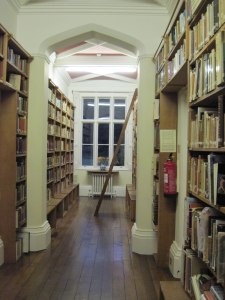
Gregynog Hall (2019)
We returned to the online conference after partaking in our own lunches at home (view Part 1 here).
The first session introduced by Lori Harvard (Swansea University) showcased how three institutions will be providing online library inductions for the academic year 20/21. Susan Glenn (Swansea University), Aimee Jones (Cardiff Metropolitan University) and Rebecca Mogg (Cardiff University) presented short lightning talks and their plans. There were slight differences between them but all three were embracing the technology and building on previously delivered online sessions.
Next up was Anita Saycell (Aberystwyth University) talking about MLA, Harvard, APA and More: Aberystwyth’s approach to reference support for all. Originally the Business School at Aberystwyth had paid for the plagiarism course Epigeum which had proved very successful in reducing plagiarism levels. However, as it uses the Harvard style of referencing it was not applicable to roll out across other schools in Aberystwyth which uses seven different referencing styles across the University. The library service was tasked with creating an in-house system complete with an assessed quiz at the end. This seemed like a large undertaking! They have managed to create something using LibGuides. They needed the quiz to encompass all the styles, and they have embedded it in Blackboard. Because it was produce in-house it will be easy to adapt and modify when needed. So far it has been rolled out to staff who have provided feedback and they are looking to launch at the end of June/beginning of July.
Following on was Naomi Prady (Swansea University) talking about Diversifying Reading List: feedback from academics and students. Naomi talked about an event organised for staff and students to discuss diversifying reading lists. Originally hoped to be a physical event it ended up being online because of the current crisis. Part of the bigger picture of universities across the UK looking to decolonise their collections and reading lists, a lot of this work has been driven by students. A BAME student talked to a librarian at Swansea asking them to decolonise the library. Not having a huge budget the library worked with the Students Union to get student suggestions and added a selection of books. They are now working on the reading lists after acknowledging that the burden shouldn’t fall on students to drive diversification but should come from academics and librarians via the reading lists. The event they held over Zoom attracted over 50 participants which was probably more than would have attended if it had been a physical session. Academics and students gave lightning talks and their were discussions and feedback.
Some problems to overcome – it is hard to diversify content for STEM subjects – but if it is difficult to diversify the curricula, one can find other authors to supplement. Leading to discussion and dialogue about the discourse too. All products of a system we are trying to change. Students can be asked to critically dissect texts. Discussions about avoiding tokenism, appropriate language, making assumptions – these topics can also be emotionally and personally draining for participants.
There are also unfortunately people who are opposed to this work, and you might find them voicing racist comments. Naomi said when this happened she was quite shocked, but it was also a wake up call to herself to realise this is the normality some people have to face all the time.
It can take time and be difficult to identify diverse resources, and it is important that students should be involved. Diverse reading lists should be core and not an add on to help to develop well rounded graduates.
Adam Barry (European Sales Executive) spoke about Lean Library: delivery instead of recovery. Lean Library is a browser plug in that makes it easier for your library users to log in to electronic resources when they are researching outside of the library environment (which we know is how a lot of people operate). It can be frustrating as a library user trying to work out whether they have access to something, where and how they log in, knowing whether it is Shibboleth or Athens, or if they need their own account etc. Lean Library gives prominent branding of their library and acts as an intermediate between domain and authentification log in. This all sounded really helpful and useful, and then I discovered that Cardiff University was already using it, but the fact had somehow passed me by!
Next up to my delight was another paper on decolonisation this time José López Blanco (University of South Wales) talking about The Decolonised Searcher: an activity with history students. Having contributed to decolonised reading lists at his previous institution (Bournemouth University), José is now working on decolonised pedagogies as well as reading lists at USW and talked about the work he has done with students. In his former role the project at Bournemouth “Why is my curriculum white?” he felt that students weren’t involved much with the library creating guides. So at USW he wanted to involve them more and created a session which was supposed to have been delivered live but ended up online because of the current situation. It involved activities whereby participants explored USW resources by looking up terms such as ‘race’ and ‘nation’ – but this is reliant on just what the library has, so then the students were encouraged to look elsewhere such as the British Library – but also national libraries for other countries, such as the National Library of South Africa. Students were encouraged to look at primary resources and to look up references to ‘slaves’ or ’empire’. One good resource mentioned was the Frederick Douglass newspaper collection held at the Library of Congress. Douglas was “the African American abolitionist who escaped slavery and became one of the most famous orators, authors, and journalists of the 19th century.” This digitised content provides a wealth of opportunity for research. José is hoping to do some ‘face to face’ test sessions to help improve the online session for when he next delivers it.
The next session by Julie Elsden and James Carr (both from Cambridge University Press) looked at a digital accessibility case study between the publisher and a student. They are now incorporating accessibility into everyday practice and have a checklist when planning new work. One thing they highlighted was the importance of having a good heading structure on websites and online resources. They are also working on a different version of CAPTCHA which is an obstacle in the user journey. They tried removing it altogether but the increase in spam traffic was too great, so now they are working on a version where only potential spam bots get challenged and not everyday users.
The final session of the day was from Joy Cadwallader (Aberystwyth University) and Allison Zink (subscriptions executive, Gale) talking about Design in Reading & Welsh Content in Gale Reference Complete. Gale have been working with Aberystwyth University to not only increase Welsh content (including archive collections) in Gale Reference Complete but also to improve accessibility and the user experience. There are a range of visualization tools such as with the Topic Finder and Term Frequency. When you look up an author or a topic, such as Dylan Thomas (the example we were shown) there are a range of tabs covering full text, literary criticism, biographies, primary sources, reviews etc.
Overall I enjoyed attending the conference, even though one’s attention does slip a little for such an extended Zoom session (well, mine does!). My favourite sessions were Amy Staniforth’s right at the start, and the decolonising reading lists talks by both Naomi Prady and José López Blanco. I spotted a twitter thread the other day where a library announced it was going to be decolonising its stock, and it was shocking to see all the negative comments where people were accusing them of throwing away texts and ‘burning books’! Such ignorance and misunderstanding. However, the highlighting of reading list decolonisations has lead me to look at my own book shelves and reading habits, which is never a bad thing!
This Gregynog event did have an evening session including a quiz. I didn’t attend but heard that it went well. Fingers crossed next year we will be back in person, enjoying cakes, checking out the antique toilet, early morning walks, and wondering whether we’ve got the haunted bedroom!












